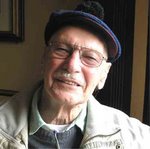
I was quite looking forward to the time when Harry and I would both retire and we could enjoy our friendship that started so many years ago. That hope was not destined to come true. Harry developed a heart problem in later years and unfortunately became a 'silent key'.
Amateur Radio was a major part of Harry's life history, something I feel I was also a part of in the early years. To get to that beginning we have to go back almost 60 years to when ham radio was called "amateur experimental".
It's hard to remember just how I met Harry but we went to the same grade school and soon found we had a common interest. Radio to us then was crystal sets, hooking up telephones between the house and the wood shed and trying to hear distant stations on the broadcast band.
Suddenly I discovered Amateur Radio and Harry shared my excitement. We became obsessed with the desire to get involved. Our wires from the house to the shed became keying lines and the telephones were exchanged for Morse keys and buzzers. We studied like crazy for months...eating, sleeping and dreaming of the day we would take our exam.
That day finally arrived: Saturday morning, 9 am, July 29, 1933. The elevator to the 14th floor seemed to take forever. Thank goodness the building only had a 12th and 14th floor, because if we had known the 14th was really the 13th, we would have failed for sure.
Walking through the door and being confronted by the all powerful Radio Inspector, the man viewed as being next to the Prime Minister, was awesome and traumatic. After managing the preliminaries indicating that we wanted to take the amateur exam, we were ushered in and seated.
I was chosen first to send a little code practice to Harry. After a couple of minutes I was told in a loud voice to stop. It was then Harry's turn to send and then in a couple more minutes there was another loud "stop". Harry and I already had our speed up to about 20 wpm so the Inspector must have been satisfied. Although we didn't realize it at the time, that was our code exam. Next came diagrams and oral questions, and all the time we were feeling failure.
Finally we were asked for 50 cents and that to us in the Depression was big money. When we asked what that was for, the Inspector barked that it was the examination fee...we had passed and did we want it or not. Actually the tough attitude was all a put-on. We found later that he bent over backwards to give the hams a break.
Harry, being a bit younger, continued on with school. I got on the air but Harry didn't have time. I eventually got a job and moved away. Harry finished school and also got a job, then joined the Air Force when Canada entered WW2 in 1939.
Over the years I saw little of Harry as we were both busy working or studying and raising a family. Little gems of information told me he went to university on his Veteran's credits and received a degree in teaching. In a few years he went back to university and got his Masters and then his PhD. With his qualifications he was appointed to the faculty of the University of British Columbia.
One evening several years ago I thought I would relax and listen to the ham radio. After listening to a few stations, I hit one that took my attention. The operator was talking about the University of BC and his son Wayne and his wife, May. Things started clicking into place...this sounded like Harry. Finally on his signover, I got the call letters, VR4CC. I couldn't believe it! It was Harry down in the Solomon Islands. When he cleared with his contact I gave him a call and he came right back with HI AL. Apparently the Canadian government had sent him out on a special educational assignment. Fortunately some departing ham had sold him a FT101 and a G5RV antenna which put him on the air.
When he returned home he brought the rig and antenna with him and stayed active. He applied for a VE7 call and was offered a reissued call sign with the suffix next to mine. He claimed it was probably the one he would have received if he had taken it when I got mine in 1933.
Later another assignment took him to California where he had further cardiac problems. Unfortunately he was unable to make it to retirement and we were never able to take up our old friendship. Harry always gave great credit for his success to ham radio. He believed it was the Amateur exam that put him in a position to take advantage of all the Right circumstances. His ticket put him in the Air Force as a Radar Officer and promotion came fast.
So to my old friend Harry, it's 73's and SK.
(for those non-hams who may be reading this, 73's means "best regards" and SK means "end of transmission".
73's...Al (VE7KC)

